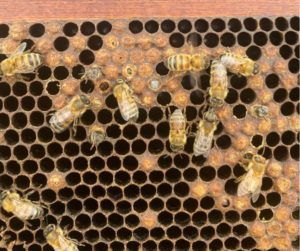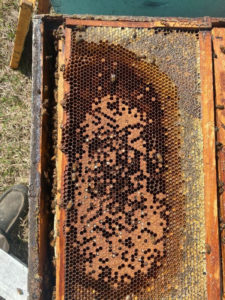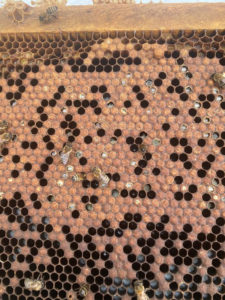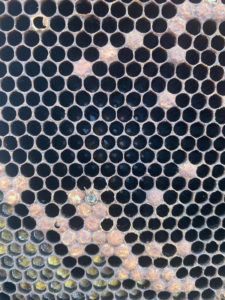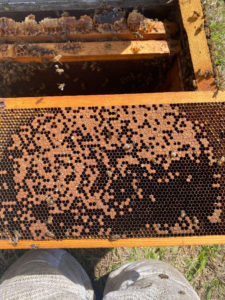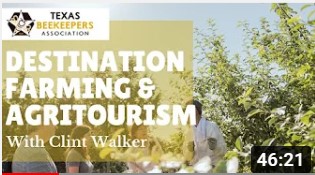Registration is now open for the 6th annual “Art of Queen Rearing” workshop, to be held at the Janice and John G. Thomas Honey Bee Facility on Saturday, 21 May, and Sunday 22 May 2022.
Head Instructor: Dr. Juliana Rangel
Invited guests: Sue Cobey, Dr. Jennifer Tsuruda (University of Tennessee), Melanie Kirby (Zia Queens, NM), Megan Mahoney (Commercial Queen Producer in Texas), and members of the Rangel Bee Lab
Registration will close on Friday, 12 May 2022 and will be handled on a first-come, first-served basis for PAID registrants. This two-day workshop is organized and delivered by the Rangel Honey Bee Lab staff, as well as special guest speakers, who will be sharing their expertise on queen rearing. As in past years, Sue Cobey will be attending the event, so there will be a demonstration on instrumental insemination of queens. Registration is $200 per person for the two-day event. Payment includes refreshments on both days, lunch on Saturday, a binder with notes, and queen rearing supplies!! Space is limited to 50 people.
We have created an online registration form for the queen rearing workshop. Please send a copy of the filled out form along with your payment to register. Unfortunately, due to TAMU rules, we cannot accept electronic or credit card payments, so you will have to fill out the form and send it via snail mail.
https://docs.google.com/forms/d/e/1FAIpQLScfZj7eaOduqpqInABjaIOJZ6jkIGQWuqz4nTqNdR7MNbNwnQ/viewform?fbclid=IwAR3oUQ_EOnwz7OOY6F_HIeUjRyS307Rw1vd871LrRCNAkhjA32GpthgRE2s
 Dodie Stillman
Dodie Stillman
TBA Youth Ambassador Program
Know a youth age 13-18 interested in bees and beekeeping?
The Texas Beekeepers Association now has a Youth Ambassador Program! Teens will receive training in bees and beekeeping in order to engage with their community and support a bee themed project of their choice. At the completion of the program, Ambassadors will receive a $500 scholarship.
Applications are due June 11, 2022. Apply at: https://forms.gle/TppCHWLd9hYmenkDA
The Bee Informed Partnership Annual Loss & Management Survey is now LIVE!

It’s time again to rally and support the beekeeping community! We are formally requesting the help of every beekeeper: you, your neighbors, your bee club and all the beekeepers you know.
The survey is open and accepting responses from April 1st to April 30th 2022. Please take a moment to submit your response to help us continue to inform about impacts to honey bee colony health.
Visit beeinformed.org/take-survey to join in the effort, learn more, and take the survey!
We rely on word of mouth to reach as many beekeepers as possible. Please share this survey announcement far and wide with your beekeeping friends and local club members!

Almond blooms and unusual brood behavior
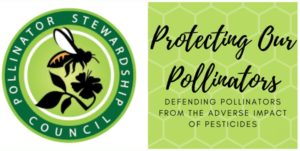
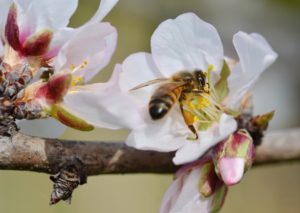
Most commercial beekeepers send bees to California for almond bloom. An effort of this magnitude can provide a wealth of information; because there are so many colonies, when a beekeeper notices something unusual, it is likely that other beekeepers may have similar experiences.
If you placed hives in almonds this year, PSC needs your help. We have received reports of unusual brood behavior and significant loss. Observers report seeing brood emerging with their proboscis paralyzed and protruding, unable to eat, staggering around, and dying. Some seem to never fully develop and die while pupating, leaving piles of dead pupae on the ground at the hive entrance.
It seems that it may be easy to miss damage as it is observable only at a specific stage and in many circumstances this damage would have already occurred by the time the beekeeper does inspections. Therefore, it is most likely seen immediately upon return from almonds. It has impacted roughly 1/3 of colonies of those reporting, and photos of this damage may be seen below. If you have had a similar experience, please contact us here or email info@pollinatorstewardship.org as we are trying to determine impact and cause.
Click for larger image
California reviewing neonicotinoids use
California is reviewing proposed regulations governing the use of neonicotinoids to protect bees, a process that has been ongoing for some time but the outcome of which will have a significant impact on pollinator health in the state and the future of neonic use in our country as a partial or full ban could pave the way for other states to employ similar regulations around the use of this dangerous class of chemicals. With the help of our scientific advisory board, the Pollinator Stewardship Council and Earthjustice have been submitting comments throughout this process. Once again, we plan to submit substantive, written comments detailing the damaging effects of neonics on pollinators including the longer term impacts of sublethal, chronic exposure over time. The Pollinator Stewardship Council invites you to consider submitting comments before the April 25th deadline, visit the California DPR page for more information.
Bill Baxter to hold position of Acting Chief Apiary Inspector
Bill Baxter will step into familiar shoes once again for the State of Texas, as he fills the position of Acting Chief Apiary Inspector.
Mr. Baxter was employed by the Texas Apiary Inspection Service on June 16, 1977 as a Foulbrood Inspector and on June 1, 2003 was promoted to Assistant Chief Foulbrood Inspector. Mr. Baxter has served in this acting role between two previous Chief Inspectors, Paul Jackson and Mark Dykes.
We’re looking forward to the future and hope that whoever fills the position lives up to the standard that Mary had set. Mary has accomplished so much in her time as Chief that positively affects Texas Beekeepers. From educating legislators at the Texas Capitol to building a foundation for resources and programs that will hopefully continue to grow in her absence. We believe her commitment to educating Texas Master Beekeepers was an efficient and targeted way to expand knowledge within the beekeeping community. This commitment as well as one to consistently learning and staying up to date on the most relevant research studies and industry news will hopefully be a crucial trait for seeking a new Chief.
Whoever fills the position will have big shoes to fill. We will be staying in touch with Texas A&M as they work to fill this position. In the interim, Texas will have Bill Baxter as the Acting Chief Apiary Inspector – providing consistency in the services we expect from the Texas Apiary Inspection Service along with the other inspectors.
Information about the Farm Animal Liability Act
Trace Blair, Jourdanton-based attorney, was interviewed in the Ag Law in the Field podcast. He talked through the three limited liability statutes that exist to protect rural Texas landowners and ag producers. Specifically, this episode offers an update to the details and rules surrounding the Farm Animal Liability Act that went into effect on September 1, 2021. There is also information about the Agritourism, and the required signage.
Links to resources mentioned on the show
– Blog post on the Texas Recreational Use statute
– Where Can I Find the Agritourism Act Signs?
– Texas Farm Animal Liability Act statute
– Texas Farm Animal Liability Act FAQs
Listen to the full podcast here:
https://aglaw.libsyn.com/episode-122-trace-blair-texas-limited-liability-statutes-update
Beekeeping and Agritourism
A new revenue stream is gaining traction with beekeepers, agritourism venues! Clint Walker of Walker Honey Farm talks with our TBA members about the business opportunity of helping connect non-beekeepers to bees. This is a mutually beneficial experience where the guests are able to better understand and appreciate bees. It’s also a great way to raise awareness for your brand and your business. Watch his Texas Beekeepers Association Annual Conference video https://youtu.be/0F9dhNX3UO8
The American Farm Bureau Foundation for Agricultural has created a new app dedicated to connecting these venues and the public. You can sign your agritourism venue up for free on the American Farm Trail app created by the Foundation. Learn more about the app and other resources at https://www.agfoundation.org/news/looking-for-agritourism-operations
Texas Beekeeping 101 Website now available
College Station, Texas – December 30, 2021 – Funded by a Southern Sustainable Agriculture Research and Education (SARE) Professional Development Program grant, AgriLogic Consulting, LLC in cooperation with Texas Beekeepers Association (TBA), the Texas Apiary Inspection Service (TAIS), Texas AgriLife Extension Service (TAES) and several Master Beekeepers have compiled this website resource in an attempt to transfer the wealth of knowledge and wisdom that currently exists within the beekeeping community itself, into a basic understanding and education of apiculture to beginning beekeepers of all ages and those who may wish to lead and guide them.
The website and its content is intended to be used by both the educators as well as those seeking to learn. The target audiences for this grant project were (1) agricultural extension agents serving the 254 Texas counties; (2) 4-H extension agents/FFA sponsors wishing to offer beekeeping contests, clinics or competition options to their youth; and (3) existing beekeepers wishing to serve as mentors to youth and new beekeepers.
We hope that you will find the site to be fun, easy to navigate, useful and most of all informative as you begin your beekeeping journey or help someone else begin theirs! The website is available free of charge and can be accessed at www.texasbeekeeping101.com. All county offices, clubs, etc. are welcome to include a link to this website on their existing websites as deemed applicable.
Please direct all questions about this resource or the project to ngueck@agrilogic.com and learn more about AgriLogic’s current and past projects at www.agrilogicconsulting.com.
Flesh Eating Bees
Some bees have developed a taste for carrion, in a delightfully twisted evolutionary turn. These vulture bees, as they’re known, feature unique gut microbes that help them digest meat.

